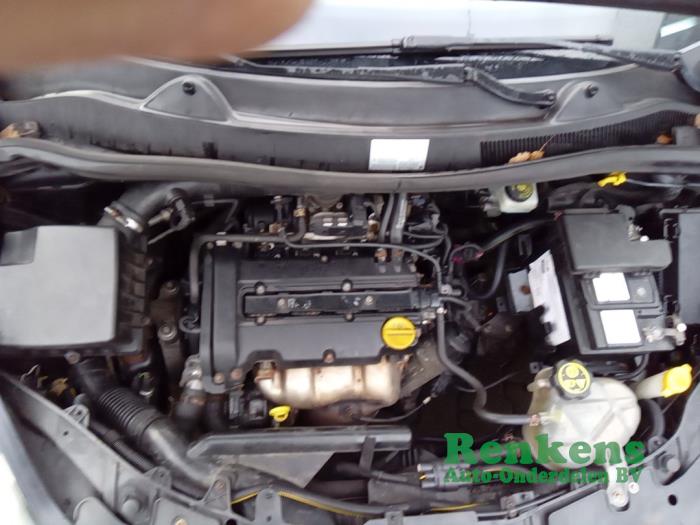Engine Purchasing Specialist Tips on Picking the Right Engine for Your Details Demands
Choosing the best engine for your specific demands includes a complex interaction of aspects that go beyond mere horse power figures. By diving right into the complexities of power versus performance, examining fuel rankings, and budgeting for long-lasting costs, one can absolutely enhance their engine selection.
Power Vs. Performance: Finding the Equilibrium
When choosing an engine, it is essential to strike an equilibrium between power and performance to satisfy your specific requirements effectively. Power describes the engine's ability to create energy for propulsion, establishing elements like velocity, hauling ability, and overall efficiency - Opel Corsa 1.4 Engine Price. On the other hand, effectiveness connects to exactly how well the engine makes use of fuel to produce power, impacting aspects such as gas economic climate and ecological friendliness
Accomplishing the right balance in between power and efficiency is vital due to the fact that an engine that is too effective might consume extreme gas, resulting in greater operating expense and unnecessary stress on the setting. Conversely, an engine that prioritizes effectiveness over power might cause sluggish efficiency, especially popular circumstances like lugging hefty loads or driving uphill.
To make a notified choice, take into consideration factors such as your common driving problems, the desired use of the car, and your individual choices. By evaluating your priorities and requirements, you can choose an engine that strikes the best equilibrium in between power and performance, ensuring optimal performance while reducing environmental effect and operating expense.
Comprehending Engine Dimension and Type
To additionally improve the choice process of an engine that strikes the optimal equilibrium between power and efficiency, it is crucial to dive into the intricacies of recognizing engine size and kind. Engine dimension refers to the total quantity of air and fuel that can be pressed with the engine cylinders.
In addition, engine type plays an essential duty in figuring out the performance features of an engine. Typical engine kinds include inline engines, V engines, and rotating engines, each with its special advantages and disadvantages. The engine type impacts factors such as the engine's dimension, weight distribution, and power distribution. Understanding the interaction between engine dimension and type is essential in choosing an engine that straightens with your particular demands and priorities, whether it be power, performance, or a balance of both.

Consider Your Vehicle's Needs
Considering your lorry's demands is a fundamental step in the engine option process to ensure ideal performance and performance. It is vital to evaluate variables such as the meant usage of the car, its weight, lugging capability, and gas effectiveness demands. If you are looking for an engine for a durable vehicle that will be utilized for towing, you will certainly need an effective engine with high torque capacities. On the other hand, if you are choosing an engine for a portable automobile largely used for city travelling, gas efficiency may be a much more critical element to take into consideration.
Furthermore, the terrain on which the automobile will mostly run need to affect your engine selection. If you frequently drive in hilly or mountainous areas, a robust engine with good climbing power will be necessary. On the other hand, for flat terrains, a more fuel-efficient engine may suffice. By aligning the engine specs with your automobile's demands, you can make sure that your automobile operates efficiently and meets your efficiency assumptions.
Examining Fuel Performance Scores
Evaluating fuel performance rankings is an essential aspect of picking the appropriate engine for your automobile, guaranteeing price financial savings and environmental sustainability. Gas effectiveness rankings, normally determined in miles per gallon (MPG) for fuel engines or kilowatt-hours per 100 miles (kWh/100 miles) for electrical engines, indicate exactly how far an automobile can travel on a details amount of gas or electrical power. Greater MPG or lower kWh/100 miles worths represent more effective engines, translating to minimized gas expenses and reduced carbon emissions.
Furthermore, contrast various engine options within the same car course to recognize the most economical choice. Elements such as engine dimension, weight, the rules of aerodynamics, and crossbreed or electric abilities can all affect click reference gas performance.
Budgeting for Long-Term Costs
Strategically planning for lasting costs is critical when choosing an engine, guaranteeing financial sustainability over the lorry's life expectancy. While the preliminary acquisition cost of an engine is a considerable element, it is vital to consider the lasting expenses linked with upkeep, repair work, and fuel usage.
Additionally, looking into the accessibility and cost of replacement parts for the picked engine is vital in budget plan preparation. By meticulously budgeting for these long-term expenditures and factoring them right into the decision-making process, individuals can pick an engine that not just satisfies their instant requirements but also continues to be affordable throughout its lifespan.
Conclusion
Finally, choosing the best engine for your details demands calls for balancing power and performance, comprehending engine dimension and kind, considering your car's requirements, read this article reviewing fuel efficiency ratings, and budgeting for lasting costs. By very carefully thinking about these click here for info elements, you can ensure that you select an engine that satisfies your demands and offers optimal performance for your lorry.
To better refine the selection procedure of an engine that strikes the optimal equilibrium between power and performance, it is crucial to delve right into the intricacies of comprehending engine size and kind. Engine size refers to the complete quantity of air and gas that can be pushed through the engine cyndrical tubes. Typical engine types consist of inline engines, V engines, and rotating engines, each with its special benefits and drawbacks. Comprehending the interaction between engine size and kind is crucial in picking an engine that straightens with your specific demands and top priorities, whether it be power, performance, or a balance of both.
